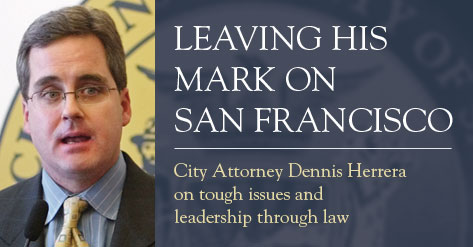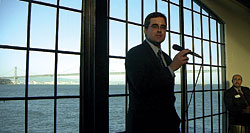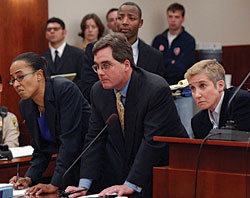
Herrera answers questions about same-sex marriages
during a press conference at City Hall in San Francisco
in March 2004. Responding to efforts by the state
attorney general and a Christian public interest
law firm to invalidate the 3,632 same-sex marriages
that were sanctioned in San Francisco during the
spring of 2004, Herrera filed briefs arguing that
municipal authorities are “independently responsible”
to uphold the Constitution.
Julie Woodford
By Budd Whitebook
I never say that though others
do,” says Dennis J. Herrera judiciously.
What others say is that Herrera,
JD ’88, is the second most powerful elected
politician in San Francisco. He is the city attorney
for both the city and county of San Francisco,
one of only 10 elected city attorneys in California.
Unlike a corporation counsel, the city attorney
does not represent an individual, such as the
mayor, but rather the interests of the city and
county. And unlike a district attorney, the city
attorney does not prosecute criminal cases.

|

San Francisco City
Attorney Dennis J. Herrera, JD ’88
|
To read Herrera’s press, he is doing a
first-rate job. His general popularity flows from
a combination of professional accomplishments
and personal modesty. A perfect example is the
San Remo Hotel case. It was a procedural matter
before the Supreme Court, which had to decide
if a developer who had lost to San Francisco in
state courts and the U.S. Court of Appeals for
the Ninth Circuit over a payment in lieu of taxes
could get another bite at the apple in the Supreme
Court.
Rather than taking on the case himself, Herrera
hired Seth Waxman, a solicitor general under President
Bill Clinton. “You can’t get much
better than Seth Waxman, and I thought that his
arguing the case offered us the opportunity to
uphold our position.
“I thought about arguing the case myself.
I really thought about it. But the way I viewed
it was if I’m going to prepare for Supreme
Court argument I would have had to set aside a
tremendous amount of time to prepare. I’m
not going to go into something if I’m not
going to dedicate the time and attention to it
that will enable me to do the best job on behalf
of my client. Knowing the demands on me with a
325-person office, the issues that come up every
day, I just knew I wasn’t going to have
time to prepare as an advocate should. I wasn’t
going to go in and just seek the glory, but not
do the preparation.”
Herrera’s willingness to forgo the glory
is disarming; perhaps he is not being humble,
but rather staying true to his calling. Though
he worked in the private sector, he has always
believed that public service is noble as well
as rewarding and interesting. “What set
that foundation for me was my experience at GW
Law. Being in Washington gave me the opportunity
and the exposure that otherwise I would not have
had. For instance, in law school, I worked at
the State Department for the first year and a
half or so. Then, my master’s program in
Latin American affairs gave me a foundation and
appreciation of public life and public service
which has stuck with me through the course of
my entire career.”
That master’s program, by the way, is the
reason Herrera took four years to finish his law
degree. “I always entertain thoughts of
finishing off the thesis so I can get the degree,”
he says with a laugh.

The legal defense team for the City of San
Francisco: from left to right, leaning on
table, are Bobbie Wilson, Herrera, and Therese
Stewart, as they listen to Judge James Warren
during a hearing at the San Francisco Superior
Court in February 2004. Herrera and San
Francisco Mayor Gavin Newsom made headlines
that year when Newsom issued marriage licenses
to gay and lesbian couples, and Herrera
challenged the constitutionality of three
sections of the California Family Code,
which exclude same-sex marriage.
Marcio Jose Sanchez/APWWP
|

|
He’s going to be much too busy for that.
Herrera is suing the state of California over
same-sex marriage. San Francisco Mayor Gavin Newsom
made news in February of 2004 when he issued marriage
licenses to gay and lesbian couples. The state
courts have found that he did not have the authority
to do so. But Newsom and Herrera decided to challenge
the constitutionality of three sections of the
California Family Code, which exclude same-sex
marriage. These sections fail, Herrera says, as
matters of equal protection and due process.
For Herrera, it’s a matter of institutional
belief as well as personal belief.
“It is a legal position and it is a belief
as to the state of the law. Now, my own personal
viewpoint of what’s right and what’s
not right is a separate issue. But I also believe
it’s the right thing to do. At this point,
it’s the morally right thing to do—to
insure that we have marriage equality.”
The way Herrera expresses his opinion on same-sex
marriage is cautious, but firm—in a word,
lawyerly. Considering how politically safe his
position is in San Francisco, he could have been
much more fiery, even belligerent, on the topic.
But that would be out of character for the soft-spoken
man with every hair in place, tie knotted just
so, and neat little San Francisco cufflinks. It
would also be out of character for a man who describes
himself as “a liberal pragmatist, left of
center, but not way to the left.”
Nor would it be in character for a man who says
this about GW Law: “I thought it was a very
interesting experience—transforming in a
lot of ways. Teaching you to think critically
and logically is a wonderful thing.”
That last sentence may be an ideal self-definition
and one that many might say fits him like a custom-made
shoe. Herrera speaks in whole sentences, even
paragraphs. He knows what he wants to say, even,
or so it seems, before the question is asked.
When he has finished speaking on a topic, he comes
to a full stop, never trailing off, never a raggedy
end, never “and so on.”
This is not meant to make him sound bloodless
or mechanical. There is a great deal of laughter
during the interview, and there is nothing pale
or stiff about him. Imagine a man who can be both
precise and loose at the same moment and you will
have the essence of Dennis Herrera. And he is
quite capable of astonishing those around him.
Here’s one example.
Herrera was first elected city attorney in 2001,
then ran for re-election in 2005. He was unopposed,
but he still decided to campaign.
“I thought it was important. I was proud
to be unopposed. I took that as a measure that
people are satisfied with the job we’re
doing, and we had support from people across the
political
spectrum in San Francisco—left, right, center,
labor, business—and that is very unusual
in San Francisco. I take a great deal of pride
in that, more for the office than for myself,
because it shows we’ve done what the people
expect us to do. As part of that, I think it’s
the height of arrogance, even if you’re
unopposed, to sit there and just expect that people
should vote for you. I view it as important to
go out and earn people’s votes. That’s
how I viewed it—to talk about the reasons
we were unopposed, to talk about the
good work we’ve done.”
So Herrera took the public’s pulse and
got 99 percent of the vote. He also got something
he was hoping to get: an earful about what people
were not happy about. He learned that there were
not enough code enforcement inspectors, making
routine inspections annoyingly slow, if not stately.
He doubled the size of the code enforcement team.
He learned that his office needed to be more relevant
to neighborhoods, so his office is expanding into
public safety. And in the face of a rising homicide
rate, he has started a gang injunction program.
These are just some of the ambitious undertakings
Herrera has assumed since his campaign. He clearly
believes that his office can do more than it traditionally
has done, and knows that—while overseeing
what amounts to a good-sized law firm—he
also has the capacity to manage more work. He
shrugs that off. There is work that needs to be
done and there are programs and enterprises that
the public wants: it’s his job to serve
public need.
Making his office more energetically involved
in the daily issues of the city’s residents
(and, naturally, more visible in the San Francisco
media) is a matter of business, not personal ambition.
Herrera has not yet decided if he will run for
reelection in 2009, and it seems pointless to
ask if he wants to be the most powerful elected
office-holder in San Francisco. He doesn’t
really talk politics. That perhaps is the one
slightly jolting characteristic of Herrera, though
if there is a jolt, it comes a day or two afterwards:
he is so affably focused on questions of law and
equity that you would not notice the obvious—a
politician who doesn’t swallow politics
with his coffee first thing every morning. Like
the dog that did not bark in the night in the
Sherlock Holmes story, the thing you might reasonably
expect to be there is missing and not noticed
immediately.
While politics is not his starting point, his
stance on same-sex marriage is certainly political.
His points of departure would be equity and constitutional
guarantees and protections. That is to say, he
is a lawyer at heart who happens to be left of
center in a left-leaning city and who is dealing
with an issue that has become political almost
everywhere else in essentially apolitical terms.
This is perhaps unconventional, a characteristic
for which Herrera has been praised. The Los
Angeles Times referred to Herrera’s
office as “an unconventional public law
office that has earned a nationwide reputation
for its aggressive legal tactics.” It is
obvious, however, that he saves his aggressiveness
for his cases. His approachable nature is perhaps
why some friends he made while at GW Law are still
close to him nearly 20 years later.
He had not seen the Foggy Bottom campus for about
five years when he visited in April. He was taken
with the transformation of both Washington and
the University. “I feel like I’m in
China, with all the construction cranes,”
he says. “It’s absolutely stunning.
And the hospital is on the other side of the street.”
The GW Law complex, which he remembered as cramped
and cluttered, now struck him as inviting and
open.
Those who knew him during his GW Law days might
not be surprised by the details of his life now.
Herrera and his wife, Anne, have a son, Declan,
nearly five years old. But there is something
unusual about where the family lives: the name
of the Potrero Hill neighborhood is Dogpatch—as
in L’il Abner. This needs an explanation,
and he offers it.
According to rumor, he says, there used to be
an area nearby called Butchertown where many of
San Francisco’s slaughterhouses and meat
packing plants were. The story goes that dogs
would come to Butchertown, steal meat, and take
it to a quieter place to eat it. Thus, Dogpatch.
While this may sound like hearsay, “That
is my story and I’m sticking to it.”
There is obviously nothing to be gained arguing
about the admissibility of evidence with a man
who takes on the state of California, manages
325 lawyers and others not known for their docility,
and runs unopposed for reelection. The Dogpatch
story stands as recited.
Author’s note: The three combined cases
challenging the constitutionality of California’s
prohibition of same-sex marriage will go to court
about the time GW Law School Magazine
goes to press. Because this is the first government
litigation making such a challenge, the case will
be important nationally and might well be appealed
no matter the initial outcome. It will be worth
watching, and betting on Dennis Herrera might
keep your money safe.
|